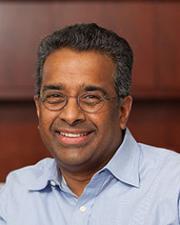 Royal Society building in London
Royal Society building in LondonMaterials sciences professor Ramamoorthy Ramesh named to Royal Society
The Royal Society, the world’s oldest scientific academy in continuous existence, has selected UC Berkeley’s Ramamoorthy Ramesh (Ph.D.’87 MSE) as a foreign fellow.
In a statement, the Royal Society recognized Ramesh, professor of physics and of materials science and engineering, and 61 other individuals for their “outstanding contributions to scientific understanding.”
The society, based in London, currently boasts about 1,600 members. Past fellows include Sir Isaac Newton, Charles Darwin, Albert Einstein and Stephen Hawking.

Ramamoorthy Ramesh, Purnendu Chatterjee Chair Professor in Materials Science and Physics
Ramesh is the Purnendu Chatterjee Chair Professor in Materials Science and Physics, as well as a senior faculty scientist at Lawrence Berkeley National Laboratory. His work has led to the development of nanosized materials that can power increasingly small but sophisticated electrical devices with minimal amounts of energy.
In 2001, Ramesh created multiferroic materials, which can demonstrate both electric and magnetic polarization when exposed to an outside field.
He also worked with computer chip giant Intel in 2018 to invent “magneto-electric spin-orbit” (MESO) logic devices. According to Intel, with this technology, the energy required to power next generation computing architectures could be a faction of the amount needed by today’s complementary metal-oxide-semiconductors. MESO devices may prove crucial to creating energy efficient technologies in areas such as artificial intelligence and the “internet of things.”
Membership in the Royal Society, founded in 1660, is considered one of the most prestigious honors in the world’s scientific community.
“At this time of global crisis, the importance of scientific thinking, and the medicines, technologies and insights it delivers, has never been clearer,” Royal Society president Venki Ramakrishnan said.
“While election to the Fellowship is a recognition of exceptional individual contributions to the sciences, it is also a network of expertise that can be drawn on to address issues of societal and global significance,” he said.